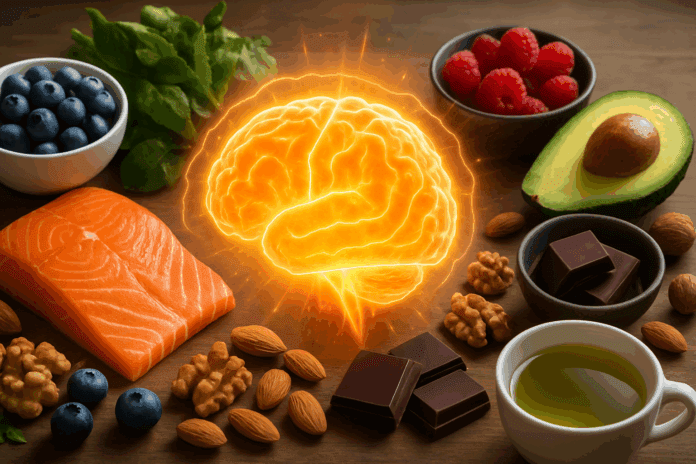The Science of Natural Energy: Why What You Eat Matters for Brain Health and Longevity
When we talk about sustaining energy throughout the day, the conversation often revolves around caffeine or quick sugar fixes. But long-term brain health and true, sustained energy require more than just a temporary boost. In fact, what you consume daily has a profound impact on your brain’s capacity to concentrate, learn, remember, and remain resilient with age. Understanding how the body converts food into energy—and how certain nutrients can support cognitive endurance—is essential for anyone looking to optimize performance and longevity.
You may also like : Best Rated Nootropics for Brain Health: Top Supplements to Enhance Focus, Memory, and Longevity
From mitochondria in your cells to neurotransmitters in your brain, energy generation is a complex biochemical process that is sensitive to nutrient availability, oxidative stress, inflammation, and hormonal balance. The best foods for energy and concentration are those that nourish not only your body’s physical systems but also your cognitive capacities. These all-natural energy boosters enhance mental stamina, reduce fatigue, and support cellular function—contributing to a longer, sharper life.
In recent years, the idea of eating to fuel your brain and protect against cognitive decline has moved from fringe wellness advice into the realm of evidence-based science. Emerging research has highlighted how nutrition influences everything from mitochondrial health to neuroplasticity. In this article, we’ll explore what is good for energy naturally, delving into the best thing for energy support that also promotes mental clarity and long-term cognitive health.
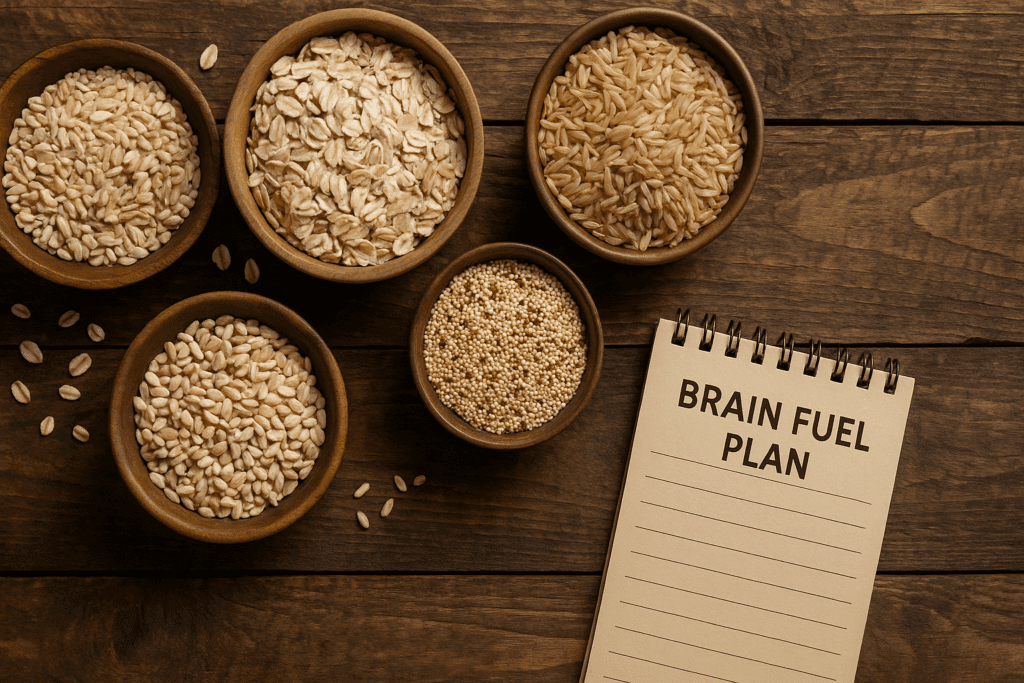
Whole Grains and Complex Carbohydrates: Sustained Fuel for Brain Function
When your brain craves energy, it turns to glucose—but not all sources of glucose are created equal. While refined carbohydrates like pastries and white bread can cause blood sugar spikes and crashes, whole grains offer a more stable source of fuel. Foods such as oats, brown rice, quinoa, and barley are rich in complex carbohydrates and fiber, which slow digestion and lead to a gradual release of glucose into the bloodstream.
Stable blood sugar levels are essential for maintaining concentration and avoiding the dreaded mid-afternoon energy slump. Several studies have shown that individuals who consume whole grains regularly exhibit improved cognitive performance, memory, and attention span compared to those who rely on simple carbs. This makes whole grains a powerful, all-natural energy booster—not just for physical stamina, but for mental sharpness as well.
Whole grains are also packed with B vitamins such as thiamine, niacin, and folate. These nutrients are crucial for brain metabolism, aiding in the production of neurotransmitters and supporting the function of mitochondria—the cellular engines responsible for energy production. The synergy of fiber, complex carbs, and micronutrients makes whole grains one of the best foods for energy and concentration, especially when consumed consistently as part of a balanced diet.
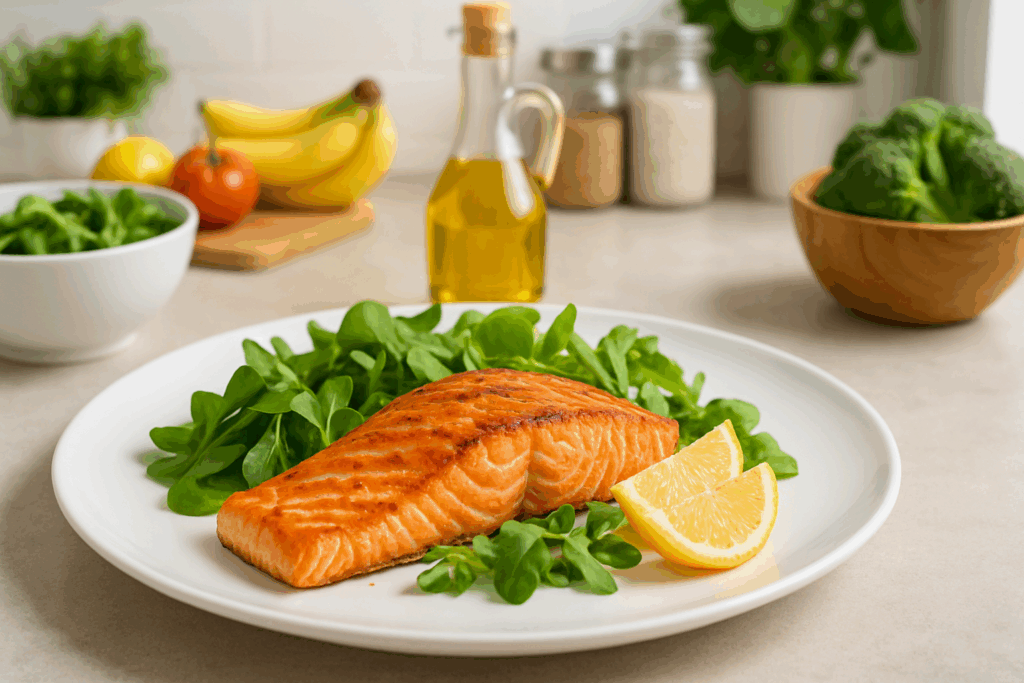
Fatty Fish: Omega-3s for Brain Power and Anti-Inflammatory Energy
Fatty fish like salmon, mackerel, and sardines are celebrated for their high content of omega-3 fatty acids—particularly EPA and DHA. These essential fats are vital for maintaining the structural integrity of brain cells and promoting the production of neurotransmitters involved in mood, focus, and memory. Omega-3s are also potent anti-inflammatory agents, which is crucial given the growing body of evidence linking chronic inflammation to cognitive decline and fatigue.
Multiple clinical trials have demonstrated that higher omega-3 intake is associated with improved mental alertness and decreased symptoms of brain fog. Furthermore, DHA has been shown to support mitochondrial efficiency, enhancing the way cells generate energy. For those looking for the best thing for energy that also supports long-term brain health, fatty fish offer an ideal balance of immediate cognitive enhancement and protective benefits against age-related decline.
What makes fatty fish particularly valuable is that they work on both short-term and long-term timelines. You might notice improved focus and sustained mental energy shortly after increasing your intake, while also reducing your long-term risk of neurodegenerative diseases such as Alzheimer’s and Parkinson’s. These dual benefits make omega-3-rich fish a cornerstone of any longevity-focused brain health plan.
Eggs, Choline, and Brainpower
Eggs are a rich source of choline, a precursor to acetylcholine, which governs memory, attention, and processing speed. Choline also supports mitochondrial function and reduces homocysteine, a metabolite linked to cognitive decline and cardiovascular disease.
A 2011 study in The American Journal of Clinical Nutrition found that adults with higher dietary choline intake performed better on memory and verbal learning tasks. Two eggs provide about 300 mg of choline—more than half the daily recommended amount.
For plant-based alternatives, shiitake mushrooms, cauliflower, and quinoa offer moderate amounts of choline.
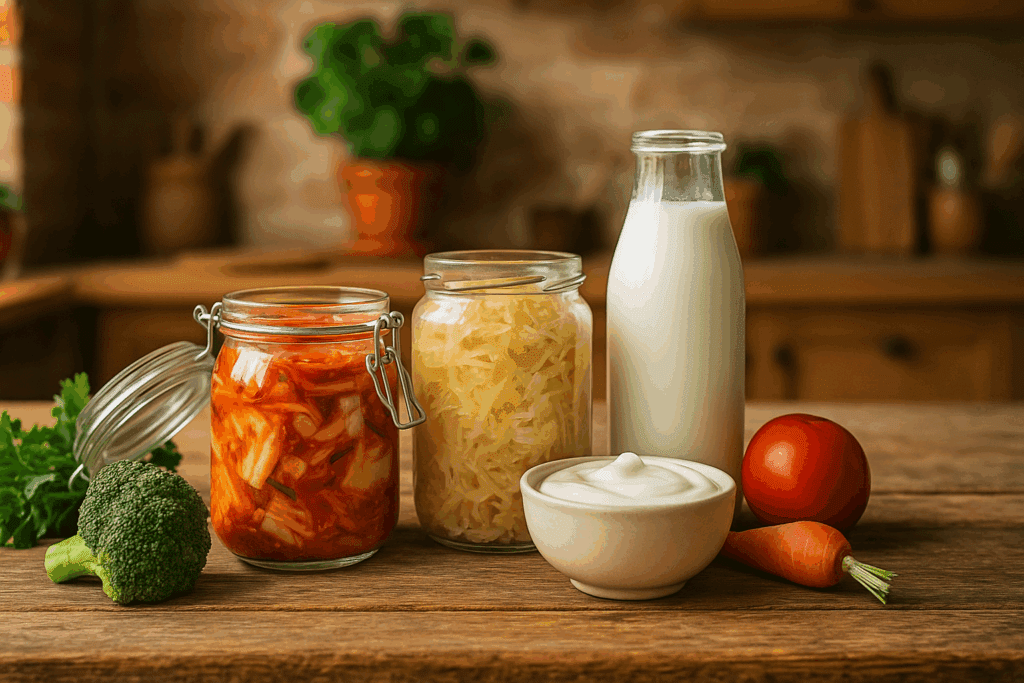
Fermented Foods: Energy Through the Gut-Brain Axis
The gut microbiome plays a crucial role in mental energy, mood, and cognition. A disrupted microbiome (dysbiosis) can lead to fatigue, brain fog, and even symptoms of depression. Fermented foods like kimchi, sauerkraut, kefir, yogurt, and miso help maintain a healthy balance of gut bacteria.
In particular, strains like Lactobacillus plantarum and Bifidobacterium longum have been shown to influence neurotransmitter production (like serotonin and GABA), reduce neuroinflammation, and enhance stress resilience.
One 2015 study in Frontiers in Aging Neuroscience suggested that probiotic consumption was associated with improved memory and reduced oxidative stress in the elderly.
L-Tyrosine–Rich Foods: The Dopamine Precursor for Mental Drive
When you’re mentally drained, it could be due to low dopamine—the brain’s motivation and reward neurotransmitter. L-tyrosine, an amino acid found in pumpkin seeds, cheddar cheese, eggs, bananas, and almonds, is a direct precursor to dopamine and norepinephrine.
A 2007 study in Brain Research showed that L-tyrosine supplementation improved cognitive flexibility and working memory during stressful multitasking. This makes tyrosine-rich foods excellent for students, professionals, and anyone facing mental overload.
For plant-based diets, pumpkin seeds are a standout, delivering both tyrosine and magnesium—another mineral tied to energy metabolism and mood regulation.
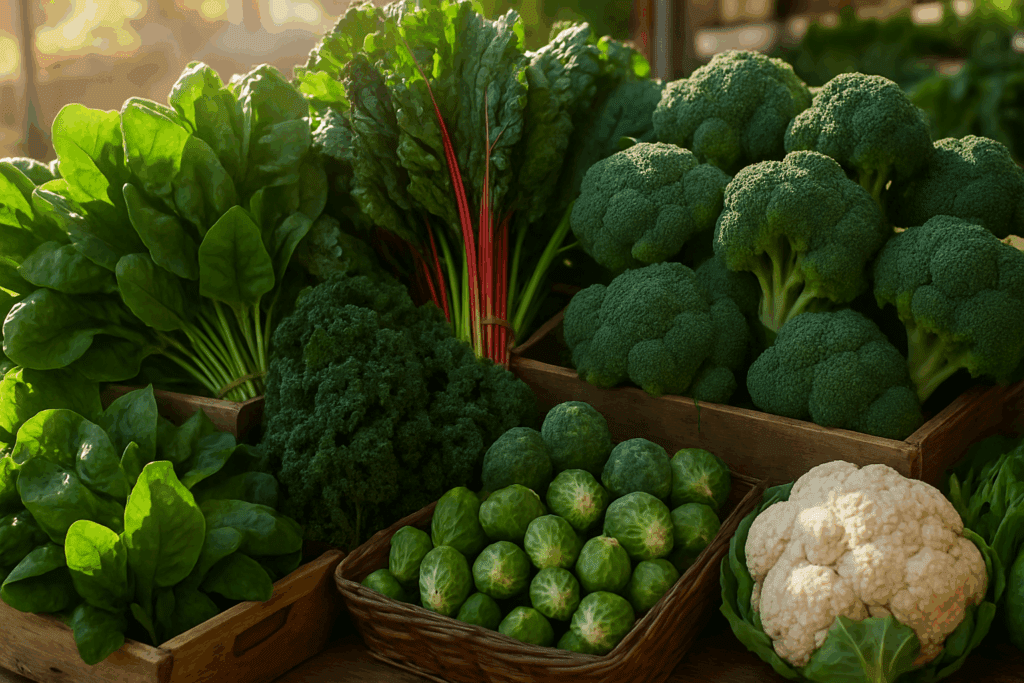
Leafy Greens and Cruciferous Vegetables: Micronutrient Density Meets Cognitive Vitality
If you’re searching for foods that increase mental energy naturally, look no further than leafy greens like spinach, kale, and Swiss chard, as well as cruciferous vegetables such as broccoli, cauliflower, and Brussels sprouts. These plant-based powerhouses are dense in nutrients critical for cognitive function, including vitamin K, folate, lutein, and beta carotene.
Vitamin K, in particular, has been linked to improved memory and learning capacity in aging populations. Folate supports neurotransmitter synthesis and DNA repair, both vital for keeping your brain cells functioning optimally over time. Lutein, a carotenoid also found in eggs, has been shown to accumulate in brain tissue and protect against oxidative damage—a key contributor to cognitive aging.
One of the overlooked reasons why vegetables are some of the best foods for energy and concentration lies in their antioxidant profile. Antioxidants neutralize free radicals and reduce oxidative stress, a major driver of fatigue and mental burnout. By supporting mitochondrial integrity and lowering inflammation, leafy greens function as an all-natural energy booster with long-term brain-enhancing effects.
Nuts and Seeds: Healthy Fats and Brain-Boosting Nutrients in a Portable Package
Nuts and seeds offer a concentrated source of healthy fats, protein, and micronutrients that make them exceptionally effective as both quick snacks and long-term brain enhancers. Almonds, walnuts, chia seeds, and flaxseeds contain alpha-linolenic acid (ALA), a plant-based omega-3, along with vitamin E, magnesium, and zinc.
Vitamin E, a potent antioxidant, protects brain cells from oxidative damage, while magnesium supports over 300 biochemical reactions involved in energy production and nerve transmission. Zinc plays a role in synaptic plasticity—the brain’s ability to form new connections—making it essential for learning and memory.
Emerging research has suggested that regular nut consumption may slow cognitive aging. A long-term cohort study published in the Journal of Nutrition found that individuals who consumed more than five servings of nuts per week had significantly better cognitive performance over time. These findings reinforce the idea that what is good for energy is also good for brain health and longevity, especially when it comes in the form of whole, natural foods.
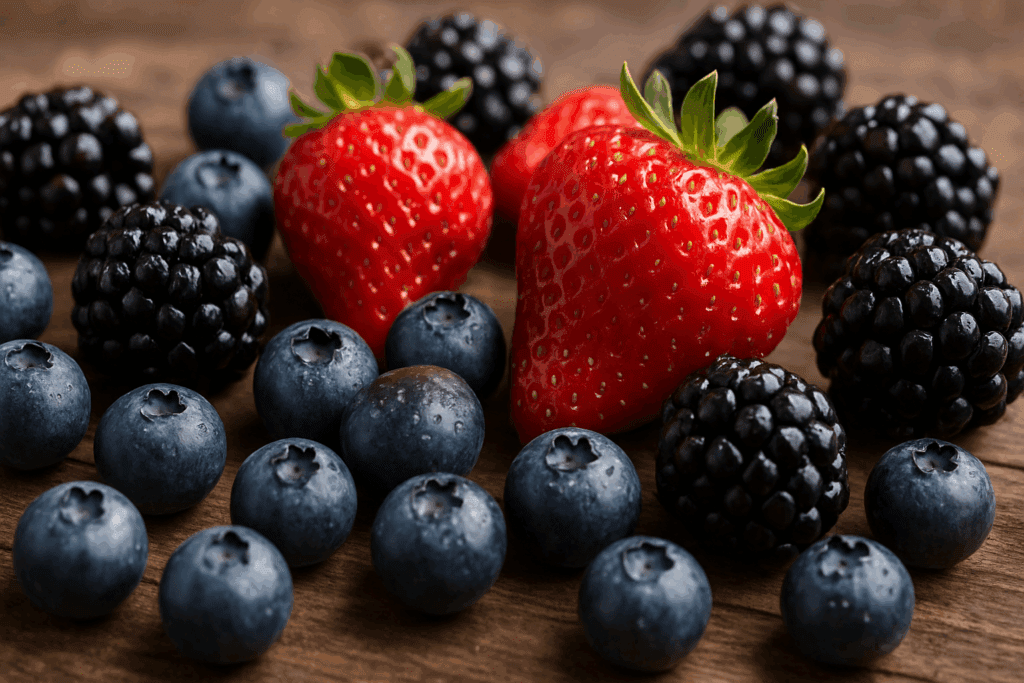
Berries: Polyphenols, Flavonoids, and Mitochondrial Support
Among the most vibrant and antioxidant-rich foods, berries like blueberries, strawberries, and blackberries have been extensively studied for their neuroprotective properties. Their benefits come largely from polyphenols—plant compounds that combat oxidative stress, reduce inflammation, and even support the growth of new brain cells through a process known as neurogenesis.
Flavonoids, a subgroup of polyphenols found in high concentrations in berries, have been linked to improved executive function, processing speed, and memory in both younger and older adults. These compounds enhance cerebral blood flow and promote mitochondrial health, directly supporting your brain’s energy systems.
Berries also play a role in gut health, which indirectly affects brain function via the gut-brain axis. A balanced gut microbiome contributes to stable mood and sustained energy levels throughout the day. This makes berries not just a delicious treat, but one of the most versatile and effective all-natural energy boosters available.
Dark Chocolate and Raw Cacao: A Sweet Solution for Mental Alertness
For those who crave something sweet yet beneficial, dark chocolate offers a compelling combination of cognitive perks. Raw cacao and minimally processed dark chocolate (ideally 70% cocoa or higher) are rich in flavanols, which have been shown to improve blood flow to the brain, reduce inflammation, and enhance neuroplasticity.
One study published in Nature Neuroscience found that flavanol-rich cocoa improved performance on memory tasks and increased function in regions of the brain involved in cognition. Additionally, dark chocolate contains small amounts of caffeine and theobromine—natural stimulants that promote alertness without the jitteriness often associated with coffee.
What makes dark chocolate one of the best foods for energy and concentration is its synergistic blend of fast-acting compounds (like caffeine) and long-term brain-enhancing antioxidants. As with all powerful foods, moderation is key; a small square or two of dark chocolate can serve as an effective, all-natural energy booster without disrupting blood sugar balance or sleep quality.
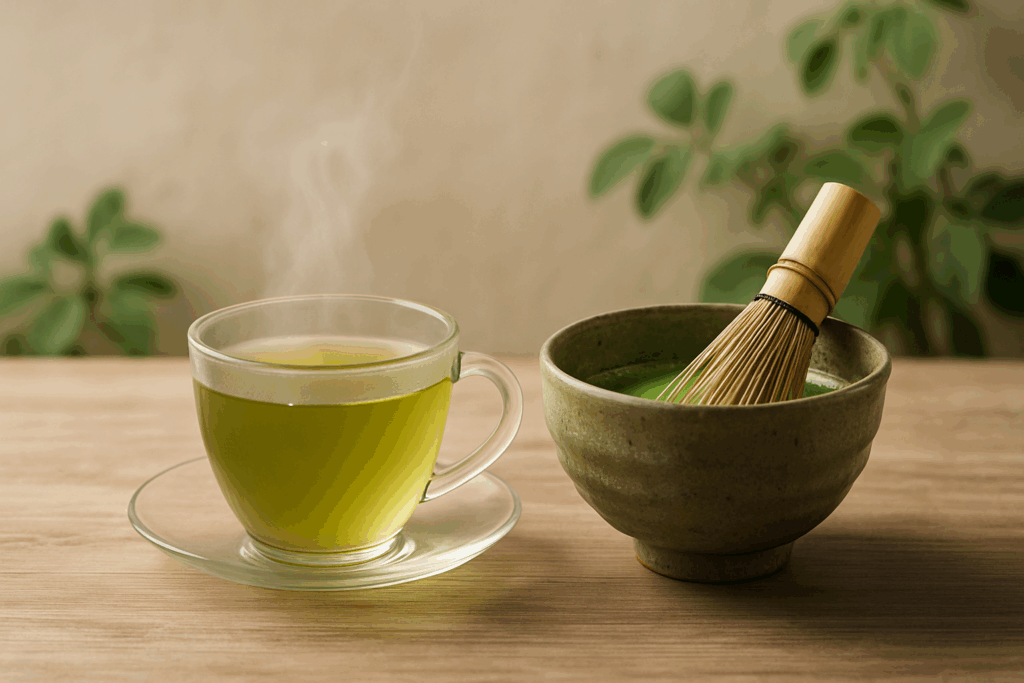
Green Tea and Matcha: Calm Focus Through L-Theanine and Caffeine Synergy
Green tea has long been celebrated for its health-promoting properties, but its unique combination of caffeine and L-theanine makes it especially powerful for sustained energy and concentration. Unlike the sharp energy spike of coffee, green tea provides a smoother lift in alertness due to L-theanine’s calming effect on the brain. This amino acid increases alpha wave activity, which promotes a relaxed yet focused mental state.
Matcha, a powdered form of green tea, contains a higher concentration of both L-theanine and caffeine, delivering a more potent but still balanced cognitive effect. Studies have shown that this combination improves attention, working memory, and reaction time, making green tea one of the best things for energy during long periods of mental work or study.
Furthermore, the catechins found in green tea act as antioxidants that protect neurons from oxidative damage. Regular consumption has been linked to reduced risk of neurodegenerative diseases and age-related cognitive decline. In essence, sipping green tea offers more than just a moment of mindfulness—it supports the longevity of your brain’s performance.
Eggs: Choline-Rich Brain Builders for Lasting Energy
Eggs are among the most nutrient-dense foods available, with a particular benefit for brain health due to their choline content. Choline is a precursor to acetylcholine, a neurotransmitter involved in memory, attention, and muscle control. Most people don’t get enough choline in their diets, making eggs a highly effective food for boosting cognitive resilience.
In addition to choline, eggs contain high-quality protein and essential fats that help stabilize blood sugar and provide sustained energy. They also supply B vitamins, particularly B12 and B6, which are crucial for energy metabolism and neurological function. This combination makes eggs one of the best foods for energy and concentration—especially when consumed at breakfast or before mentally demanding tasks.
Clinical research has associated higher choline intake with improved cognitive performance and a reduced risk of dementia. When looking for all-natural energy boosters that also promote brain longevity, eggs deliver an impressive nutritional profile in a compact, affordable package.
Avocados: Monounsaturated Fats and Mitochondrial Function
Avocados offer a unique blend of monounsaturated fats, fiber, potassium, and antioxidants that make them highly beneficial for both physical and mental energy. The brain is composed of nearly 60% fat, and consuming healthy fats like those found in avocados helps maintain cell membrane integrity and improve synaptic function.
In particular, monounsaturated fats have been linked to increased cerebral blood flow and reduced inflammation—both critical factors for maintaining concentration and preventing cognitive decline. Avocados also support mitochondrial health, a key determinant of how efficiently your cells produce energy. Without optimal mitochondrial function, even a nutrient-rich diet can fall short in delivering noticeable vitality.
One study published in the journal Nutrients found that daily avocado consumption improved working memory and executive function in older adults. This positions avocados not only as a source of physical nourishment but also as a cognitive enhancer that promotes longevity and vitality across the lifespan.
Frequently Asked Questions: All-Natural Energy Boosters for Brain Health and Longevity
1. How do natural energy boosters compare to caffeine or synthetic stimulants for sustained brain function?
While caffeine can offer a temporary spike in alertness, it’s not always the best thing for energy over the long term. Many people experience crashes, dependency, or anxiety with repeated use. In contrast, an all natural energy booster like maca root, Cordyceps mushroom, or adaptogenic herbs builds resilience in your nervous system and supports consistent mental clarity without overstimulation. These compounds often work by enhancing mitochondrial function or balancing cortisol levels, rather than overstimulating neurotransmitter systems. As a result, individuals often find that foods that increase mitochondrial efficiency and blood flow deliver smoother, longer-lasting support for both body and brain.
2. Can natural energy boosters help improve focus and reduce procrastination in high-performing adults?
Yes, and in ways that go beyond what most people expect. Chronic procrastination is often tied to mental fatigue, neurotransmitter imbalances, and even low dopamine availability. Several of the best foods for energy and concentration—including pumpkin seeds, polyphenol-rich fruits, and fermented vegetables—provide key precursors like tyrosine, magnesium, and short-chain fatty acids that influence dopamine pathways. When combined with stress-adaptive herbs and adequate hydration, these foods can significantly boost mental stamina and intrinsic motivation. If you’re asking what is good for energy in the context of brain-driven productivity, start by addressing these deeper biochemical patterns rather than just masking symptoms with stimulants.
3. Are there long-term risks with using natural foods and herbs to enhance energy?
Most natural strategies are safe for long-term use, especially when tailored to your physiology and consumed in food-based forms. However, moderation and variety are key. For example, using Rhodiola rosea daily for months may eventually blunt its effectiveness unless cycled properly. That’s why the best thing for energy isn’t just one superfood or supplement, but rather a diverse, seasonal approach that respects your body’s rhythms. The best foods for energy and concentration are those that reduce oxidative stress and support hormonal balance without overwhelming your adrenal system. Consider rotating between different booster for energy strategies based on lifestyle demands, sleep quality, and mental workload.
4. Can gut health influence mental energy and concentration?
Absolutely—and this connection is often underestimated. Your gut microbiota produce numerous metabolites, including GABA and serotonin, which directly impact brain energy and mood. Fermented foods and prebiotic fibers are underrated tools in the all natural energy booster toolkit. In fact, researchers are now exploring how microbiome diversity influences mental performance in high-stakes settings like space travel and military operations. If you’re looking at what is good for energy, don’t overlook kefir, miso, and high-fiber vegetables like Jerusalem artichokes. These foods that increase gut-brain communication can restore mental vitality more deeply than caffeine ever could.
5. How do natural energy foods support aging brains differently than synthetic options?
As we age, mitochondrial efficiency, cerebral blood flow, and neurotransmitter levels all decline—creating a perfect storm for brain fog and fatigue. Unlike synthetic stimulants that can accelerate burnout, the best foods for energy and concentration in aging populations are those that enhance cellular resilience. Pomegranates, beets, and dark leafy greens, for example, contain compounds that support nitric oxide production and mitochondrial biogenesis. These foods that increase oxygen delivery and ATP production do so in a way that’s regenerative, not depleting. If you’re serious about long-term cognitive performance, the best thing for energy may be to replace short-term fixes with long-range neuroprotective strategies rooted in nature.
6. What psychological factors affect how well natural energy boosters work?
Mental state can either amplify or block the effects of even the best foods for energy and concentration. For example, someone with chronic anxiety might not feel the energizing benefits of Rhodiola or magnesium-rich foods until they regulate their stress response. Similarly, your belief system, expectations, and emotional resilience all shape how your brain metabolizes and responds to nootropic foods. For an all natural energy booster to work optimally, it should be paired with stress management practices like deep breathing, mindfulness, or positive reframing. In other words, the best thing for energy isn’t just biochemical—it’s also psychological and behavioral.
7. Can personalized nutrition make natural energy strategies more effective?
Yes. Personalized nutrition—based on genetics, microbiome testing, and blood markers—is revolutionizing how we understand what is good for energy for different individuals. For example, someone with the MTHFR gene mutation might struggle to activate B vitamins from food, requiring methylated supplements. Or an individual with sluggish detox pathways might feel fatigued from foods high in histamine, even if those foods are generally considered a booster for energy. A personalized plan ensures you’re getting the best foods for energy and concentration in a way that works with your biology, not against it. Precision is becoming as important as purity when it comes to long-term energy.
8. Are there social or environmental influences on natural energy levels?
Yes, and they often override dietary factors. Social isolation, chronic digital exposure, and poor indoor air quality can all undermine even the most strategic use of foods that increase brain energy. Connection, purpose, and nature exposure act as non-food-based all natural energy boosters by resetting cortisol and enhancing circadian alignment. Even shared meals and laughter have been shown to increase oxytocin and reduce fatigue biomarkers. The best thing for energy might be a walk in the park with a friend, paired with a beet-berry smoothie. Holistic energy optimization considers context as much as content.
9. What are some emerging or experimental natural energy enhancers?
Exciting new research is exploring compounds like urolithin A (from pomegranate metabolism), spermidine (from wheat germ and natto), and PQQ (from fermented soy and kiwi) as advanced booster for energy tools. These molecules promote mitophagy—the cleanup and renewal of mitochondria—making them powerful allies in cellular longevity and vitality. While they aren’t yet mainstream, they’re shaping the future of what is good for energy, especially for people seeking performance without the downsides of synthetic enhancers. These foods that increase mitochondrial health are being studied in elite athletes, shift workers, and neurodegenerative disease models. The frontier of natural energy support is becoming more molecular, more personalized, and more precise.
10. How can I build a daily routine around all-natural energy boosters for long-term impact?
The secret is consistency and timing. Start your day with hydration and sunlight to prime circadian hormones. Use high-protein, polyphenol-rich breakfasts like eggs with greens or smoothies with berries and chia seeds. Midday is ideal for nitrate-rich foods like beet salad or arugula wraps, while late afternoon calls for relaxing booster for energy choices like L-theanine, ashwagandha, or adaptogenic teas. Over time, this rhythm supports metabolic flexibility, adrenal balance, and neuronal resilience—the true foundations of the best thing for energy across your lifespan. Commit to daily micro-habits built on all natural energy boosters, and your energy won’t just last the day—it will scale with your ambitions.
Conclusion: Nourishing Your Brain Naturally—The Sustainable Path to Energy, Focus, and Longevity
In a culture that often seeks instant gratification through stimulants, quick fixes, and over-the-counter solutions, it’s easy to overlook the long-term power of food as a sustainable source of energy and mental clarity. But science continues to confirm what many traditional cultures have known for centuries: the foods we eat shape not just our bodies, but our minds—and our future.
Whether you’re navigating a demanding work schedule, pursuing academic goals, or simply striving to age gracefully, understanding what is good for energy on a biological level can radically shift how you approach nutrition. The best thing for energy isn’t found in synthetic formulas or extreme diets, but in whole, natural foods that fuel both your brain and body in harmony. Choosing the best foods for energy and concentration means opting for those that support mitochondrial health, regulate blood sugar, reduce inflammation, and enhance neurotransmitter function.
From omega-3-rich fish and dark leafy greens to antioxidant-packed berries and choline-dense eggs, these all-natural energy boosters do more than elevate your performance in the moment—they build cognitive reserves that serve you well into old age. They help you stay sharp, resilient, and energized not just for the next few hours, but for the next few decades.
By consistently incorporating these foods that increase brain power and vitality into your daily routine, you’re investing in a future defined not by decline, but by cognitive strength, emotional balance, and a zest for life. The path to long-lasting mental energy doesn’t lie in novelty or marketing hype—it lies in the kitchen, on your plate, and in your everyday choices.
Further Reading:
Best foods to eat to give you energy

